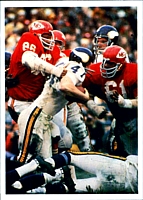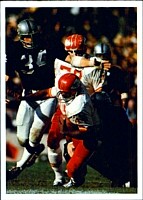Related Research Articles

Super Bowl IV was an American football game played on January 11, 1970, at Tulane Stadium in New Orleans, Louisiana. It was the fourth and final AFL–NFL World Championship Game in professional football prior to the AFL–NFL merger taking effect the following season. The American Football League (AFL) champion Kansas City Chiefs defeated the National Football League (NFL) champion Minnesota Vikings by the score of 23–7. This victory by the AFL squared the Super Bowl series with the NFL at two games apiece as the two leagues merged after the game.

Henry Louis Stram was an American football coach. He is best known for his 15-year tenure with the Dallas Texans / Kansas City Chiefs of the American Football League (AFL) and National Football League (NFL).

Leonard Ray Dawson was an American football quarterback who played in the National Football League (NFL) and American Football League (AFL) for 19 seasons, primarily with the Kansas City Chiefs franchise. After playing college football at Purdue, Dawson began his professional career with the NFL in 1957, spending three seasons with the Pittsburgh Steelers and two with the Cleveland Browns. He left the NFL in 1962 to sign with the AFL's Chiefs, where he spent the last 14 seasons of his career, and rejoined the NFL after the AFL–NFL merger.
James Efflo Tyrer was an American professional football offensive tackle who played in the American Football League (AFL) for the Dallas Texans / Kansas City Chiefs. He also played in the National Football League (NFL) for the Chiefs and the Washington Redskins.

Larry Craig Morton is an American former professional football player who was a quarterback in the National Football League (NFL) for 18 seasons, primarily with the Dallas Cowboys and Denver Broncos. He played college football for the California Golden Bears, receiving All-American honors, and was selected by the Cowboys fifth overall in the 1965 NFL Draft. Following nine seasons with the Cowboys, a quarterback controversy with Roger Staubach led to Morton joining the New York Giants for three seasons. He spent his final six seasons as a member of the Broncos, winning NFL Comeback Player of the Year and AFC Offensive Player of the Year in 1977.
The National Football League Coach of the Year Award is presented annually by various news and sports organizations to the National Football League (NFL) head coach who has done the most outstanding job of working with the talent he has at his disposal. Currently, the most widely recognized award is presented by the Associated Press (AP), although in the past several awards received press recognition. First presented in 1957, the AP award also gave out an award to coaches of the American Football League (AFL) from 1961 to 1969. The Sporting News has given a pro football coach of the year award since 1947 and in 1949 gave its award to a non-NFL coach, Paul Brown of the All-America Football Conference's Cleveland Browns. Other NFL Coach of the Year awards are presented by Pro Football Weekly/Pro Football Writers of America and the Maxwell Football Club. The United Press International (UPI) NFL Coach of the Year award was first presented in 1955. From 1960 to 1969, before the AFL–NFL merger, an award was also given to the most outstanding coach from the AFL. When the leagues merged in 1970, separate awards were given to the best coaches from the American Football Conference (AFC) and National Football Conference (NFC). The UPI discontinued the awards after 1996.

Stephen Ray Fuller is an American former professional football quarterback who played in the National Football League (NFL) for 10 seasons. He played college football for the Clemson Tigers, where he was twice named ACC Player of the Year, and was selected by the Kansas City Chiefs in the first round of the 1979 NFL Draft. Fuller played his first four seasons with the Chiefs and was a member of the Los Angeles Rams during his fifth season. He joined the Chicago Bears in 1984, where he spent four seasons as a backup and was a member of the team that won the franchise's first Super Bowl title in Super Bowl XX. In his final season, Fuller was a member of the San Diego Chargers.
Peter Falconer Beathard is a former American football quarterback who played professionally in the American Football League (AFL), the National Football League (NFL), and the World Football League (WFL). He is the younger brother of former NFL executive Bobby Beathard and is current Jacksonville Jaguars quarterback C. J. Beathard’s great-uncle.
John Golden Richards was an American professional football player who was a wide receiver in the National Football League (NFL) for the Dallas Cowboys and Chicago Bears. He played college football for the BYU Cougars and Hawaii Rainbow Warriors.

31 quarterbacks have started for the National Football League's Kansas City Chiefs since their franchise began. The team has also had numerous backup quarterbacks that have stolen the spotlight from the starters.
Thomas William Brown is a two-time Super Bowl winning former professional football player and major league baseball player. He's the first athlete to win both a Super Bowl and hit a home run in a major league baseball game and the only one other than Deion Sanders to do so.
The 1962 AFL Championship Game was played on December 23 at Jeppesen Stadium in Houston, Texas. The Western Division's Dallas Texans (11–3) defeated the host Houston Oilers of the Eastern Division by a score of 20–17 after two overtimes. The Oilers were trying for their third consecutive American Football League title.
The 1966 Kansas City Chiefs season was the team's seventh season in the American Football League (AFL) and fourth in Kansas City. With an 11–2–1 regular season record, the Chiefs won the Western Division and defeated the Buffalo Bills 31–7 to win their second AFL Championship, their first in Kansas City.
Otis Taylor was an American professional football wide receiver who played in the American Football League (AFL). He played college football for the Prairie View A&M Panthers and was drafted by the Kansas City Chiefs in the fourth round of the 1965 AFL Draft. He was also selected in the 15th round of the 1965 NFL Draft by the Philadelphia Eagles, but he chose to play in the AFL for the Chiefs where he would spend his entire career.
Walter Martin Corey was an American professional football player and coach. He played as a linebacker for seven seasons in the American Football League (AFL) before coaching in the National Football League (NFL) for 28 seasons.
The Kansas City Committee of 101 was founded by Jack Wheeler. The name was chosen because the membership was limited to 101 Kansas City Chiefs fans and cost $1,000 annually. The group began presenting its annual NFL awards in 1969, initially as NFL and AFL Awards. However, after the 1970 AFL-NFL merger, the awards have been given to the top AFC and NFC players and coaches. The "Committee of 101" refers to a national media committee consisting of 101 sportswriters and sportscasters who cover the NFL. They are responsible for voting on the top offensive player, defensive player, and coach in each of the National Football League conferences, rather than for the entire NFL.
Herbert Anthony Adderley was an American football cornerback who played for the Green Bay Packers and the Dallas Cowboys of the National Football League (NFL). In 1980, he was enshrined in the Pro Football Hall of Fame.
The 1971 Stanford Indians football team represented Stanford University during the 1971 NCAA University Division football season. Led by ninth-year head coach John Ralston, the Indians were 8–3 in the regular season and repeated as Pacific-8 Conference champions at 6–1.

The 1969 AFL Championship Game was the 10th and final championship game of the American Football League, and the league's final game prior to its merger with the National Football League on February 1, 1970.
James Ray Fuller is an American football coach and former defensive back who is currently the offensive coordinator for the San Antonio Gunslingers of the National Arena League (NAL). He played college football at Walla Walla CC and Portland State before being selected in the 8th round of the 1992 NFL Draft; he went on to play three seasons with the San Diego Chargers and Philadelphia Eagles while also spending time in the World League of American Football (WLAF) for the Scottish Claymores and Arena Football League (AFL) for the Portland Forest Dragons. He later served as a coach for the Forest Dragons, Bakersfield Blitz, Philadelphia Soul, Dallas Desperados, Dallas Vigilantes, Richmond Raiders, Maine Mammoths, and Jacksonville Sharks.
References
- ↑ "My High School: South Oak Cliff," The Dallas Morning News sports section online.
- 1 2 Moran, Sheila (October 6, 1969). "Livingston rescues Chiefs". Evening News. Newburgh, New York. Associated Press. p. 13B.
- ↑ "Tantalizing names available in second day of grid draft". Lawrence Daily Journal-World. (Kansas). Associated Press. January 31, 1968. p. 21.
- ↑ "Livingston sparks Chiefs, 26–13". Lawrence Journal-World. (Kansas). Associated Press. October 6, 1969. p. 13.
- ↑ Moore, Bob (June 25, 2015). "Chapter Three: Is Mike Livingston a franchise QB?". Kansas City Chiefs. (club history). Retrieved March 3, 2016.
- ↑ Rank, Adam (2013-03-18). "Greatest Cinderella stories in NFL history". National Football League . Retrieved 2013-03-25.
- ↑ "Dawson returns to lift KC". Lawrence Journal-World. (Kansas). Associated Press. November 3, 1969. p. 13.
- ↑ Stellino, Vito (November 14, 1975). "Livingston: a switch from Indian to Chief". Pittsburgh Post-Gazette. p. 14.
- ↑ Gosselin, Rick (September 13, 1979). "Mike Livingston a class individual". Beaver County Times. Pennsylvania. UPI. p. C4.
- ↑ "Livingston to start for Chiefs Sunday". Spartanburg Herald. South Carolina. Associated Press. October 17, 1979. p. C1.
- ↑ Timms, Leslie (November 1, 1979). "Fuller happy to be starter". Spartanburg Herald. South Carolina. p. C1.
- ↑ "Livingston vs. ex-teammates". Spartanburg Herald. South Carolina. Associated Press. August 18, 1980. p. B1.
- ↑ "Feds upset stars in finale". Reading Eagle. Pennsylvania. news services. July 4, 1983. p. 22.
- ↑ "Ralston says Michigan much improved". Lodi News-Sentinel. California. UPI. July 8, 1983. p. 13.
- ↑ "Wranglers sign while other teams cut". Ocala Star-Banner. Florida. Associated Press. February 21, 1984. p. 8C.